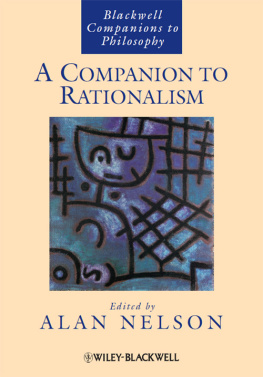ANTHEM COMPANIONS TO SOCIOLOGY
Anthem Companions to Sociology offer authoritative and comprehensive assessments of major figures in the development of sociology from the past two centuries. Covering the major advancements in sociological thought, these companions offer critical evaluations of key figures in the American and European sociological tradition and will provide students and scholars with an in-depth assessment of the makers of sociology, charting their relevance to modern society.
Series Editor
Bryan S. Turner City University of New York, USA, and Australian Catholic University, Australia
Forthcoming titles in this series include:
The Anthem Companion to Hannah Arendt
The Anthem Companion to Auguste Comte
The Anthem Companion to Everett Hughes
The Anthem Companion to Karl Mannheim
The Anthem Companion to Robert Park
The Anthem Companion to Talcott Parsons
The Anthem Companion to Phillip Rieff
The Anthem Companion to Georg Simmel
The Anthem Companion to Gabriel Tarde
The Anthem Companion to Ferdinand Tnnies
The Anthem Companion to Ernst Troeltsch
The Anthem Companion to Thorstein Veblen
Anthem Press
An imprint of Wimbledon Publishing Company
www.anthempress.com
This edition first published in UK and USA 2016
by ANTHEM PRESS
7576 Blackfriars Road, London SE1 8HA, UK
or PO Box 9779, London SW19 7ZG, UK
and
244 Madison Ave #116, New York, NY 10016, USA
2016 Alan Sica editorial matter and selection;
individual chapters individual contributors
The moral right of the authors has been asserted.
All rights reserved. Without limiting the rights under copyright reserved above, no part of this publication may be reproduced, stored or introduced into a retrieval system, or transmitted, in any form or by any means (electronic, mechanical, photocopying, recording or otherwise), without the prior written permission of both the copyright owner and the above publisher of this book.
British Library Cataloguing-in-Publication Data
A catalogue record for this book is available from the British Library.
Library of Congress Cataloging-in-Publication Data
Names: Sica, Alan, 1949 editor.
Title: The Anthem companion to Weber / edited by Alan Sica.
Description: New York : Anthem Press, 2016. | Includes bibliographical references and index.
Identifiers: LCCN 2016029231 | ISBN 9781783083794 (hardback : alk. paper)
Subjects: LCSH: Weber, Max, 18641920Political and social views. | SociologyPhilosophy.
Classification: LCC H59.W4 A58 2016 | DDC 301dc23
LC record available at https://lccn.loc.gov/2016029231
ISBN-13: 978-1-78308-379-4 (Hbk)
ISBN-10: 1-78308-379-4 (Hbk)
This title is also available as an e-book.
Alan Sica
Those who would think about the nature of society and history in our time have been living off the big men of the nineteenth century. There has not yet appeared any twentieth-century political theorist, sociologist, historian, or economist whose work is truly up to their level. C. Wright Mills, Introduction to W. E. H. Leckys History of European Morals from Augustus to Charlemagne (Mills, 1955)
The Budding Classicist
Max Weber fashioned himself into a historian and economist of ancient Rome by means, it can be argued, of pointed scholarly disputes with a set of accomplished and much older scholars one in particular. This protracted, genteel set of disagreements amounted to a modified Oedipus tale not unlike, yet more important for his research than the famous one that erupted between Weber and his father when he evicted Max Weber Sr. from his home in 1897, six weeks before the latters sudden death in a foreign city. As is well documented (Marianne Weber, 1975: 230264; Radkau, 2009: 6469, 145ff), the latter dispute ignited endless emotional trouble for Weber during the remaining 22 years of his life. Yet the former set of disagreements, I think it can be shown, inspired his early writing and gave him a lifelong impetus to work extremely hard at his scholarship.
A hint of all this comes from his wifes indispensable biography:
At the beginning of 1877, before his fourteenth birthday, Max wrote evidently as a belated Christmas present two historical essays after numerous sources, one About the Course of German History, with Special Regard to the Positions of the Emperor and the Pope, the other About the Roman Imperial Period from Constantine to the Migration of Nations; the latter was Dedicated by the Author to his Own Insignificant Self as well as to his Parents and Siblings. The text of the second essay is illustrated with a sketch of Constantinople, the family tree of Constantius Chlorus [Constantius I, The Pale] and daintily drawn heads of the Caesares and Augusti, apparently copied from antique coins the boy was collecting at the time. (Marianne Weber, 1975: 46)
All the key ingredients of his modus operandi are here if one were to work backward in Webers life from his Agrarian Sociology of Ancient Civilizations (1909) to these memorable pieces of juvenilia 32 years before. Marianne records the reading habits of the precocious scholar, which by modern standards seem quite improbable: But books were the most important thing in his rich boyhood (45). He absorbed Spinoza, Schopenhauer, Kant, Machiavelli, Luther, histories by Curtius, Mommsen, Treitschke, all of Goethes works, and so on. I dont daydream, I dont write poetry, so what else shall I do but read? So I am doing a thorough job of that ... My progress is slow, because I make many notes as I read (46; 4950). As Marianne also observes, His judgments on the Greek and Latin classics Homer, Herodotus, Virgil, Cicero, Sallust show precocious, independent mental activity and astounding intellectual intensity (50). In defending his negative appraisal of Cicero, unorthodox at the time, Weber claims that neither his teachers nor books influenced his attitude toward the great orator, for I have only recently looked this period up in important works, such as Mommsens history of Rome (54).
The Looming Family Friend
By the time Theodor Mommsen (18171903) won the second Nobel Prize for Literature in 1902, only 11 months before his death at 85, he was the most important humanist scholar in Germany, perhaps anywhere, and surely the leading classicist in an era when ancient historiography crowned the humanities. The first Prize winner in 1901 had been Sully Prudhomme, a French poet of whom there is no mention in the New Oxford Companion to Literature in French (1995). The 1903 winner was Bjrnstjerne Martinus Bjrnson, another forgotten Norwegian poet. Mommsen, however, is as pertinent today as he was then, especially when considering the early scholarship of Max Weber who was 38 when Mommsen received the Nobel Prize and who was still enduring the agonies of mental collapse that had begun several years before. One of Mommsens four sons, Karl, had been a close friend of Max while they were schoolboys, and another, the physician Ernst, married Webers younger sister, Klara (Klrchen or Mdi), in 1894. Mommsen was a regular visitor to the Weber household when Max was growing up and had already become internationally famous for his





